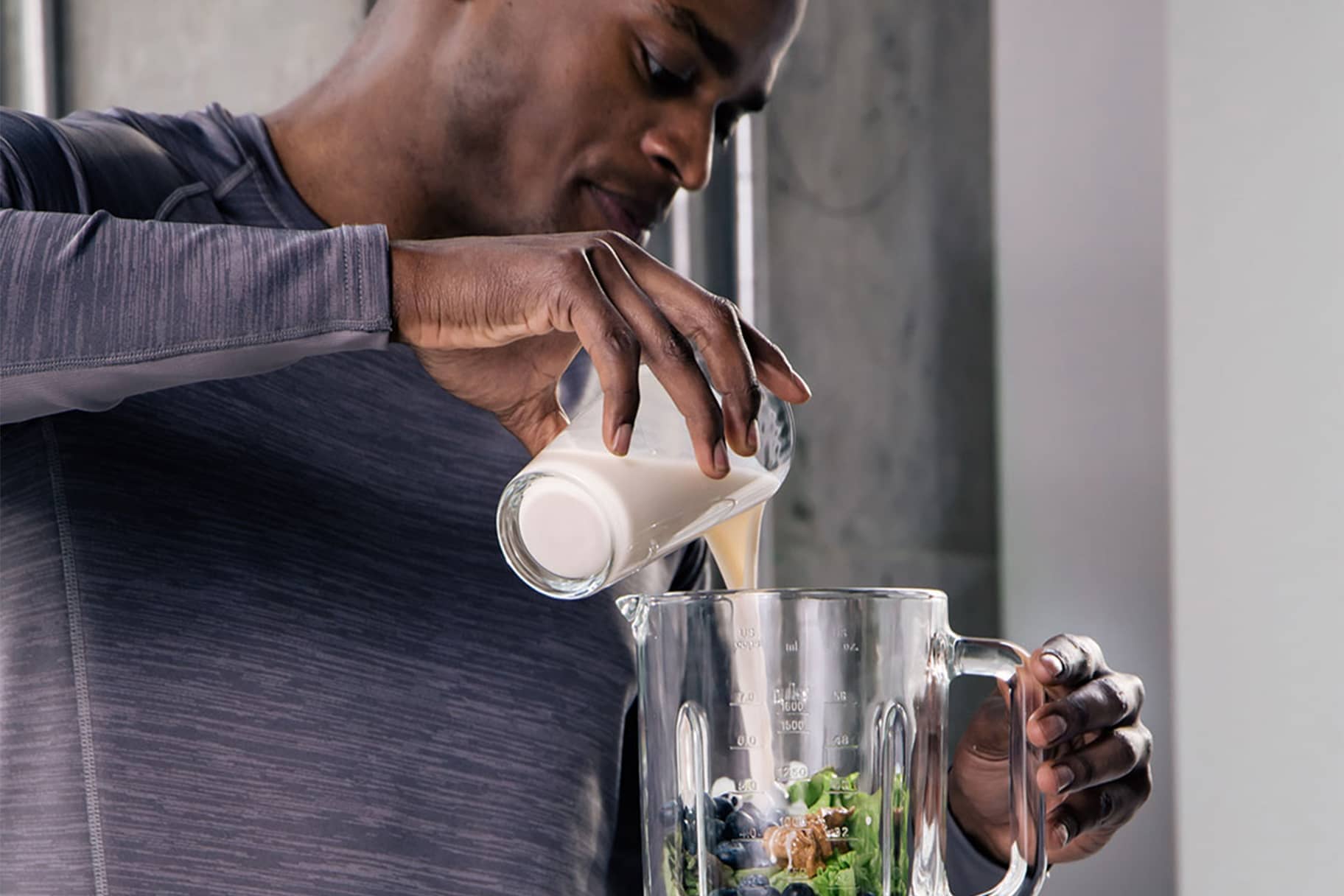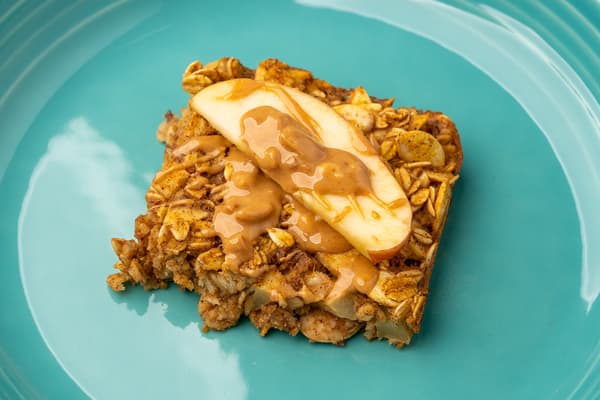What Is Protein Powder? And Should I Try It?
Nutrition
Three registered dietitians give the scoop on this popular protein supplement.

If you're looking to include more protein into your post-workout meal or snack, you might be curious about protein powder. But what does protein powder do, and should it be a part of your fuelling programme?
Protein powder is protein that's extracted from animal sources, such as casein and whey, or plant-based ones like soy and peas, said Julie Upton, MS, RD, CSSD and co-founder of Appetite for Health.
"Manufacturers will then generally add essential nutrients, flavours and colouring agents to create a finished powder that can be blended with water or other liquids, as well as used as an ingredient in recipes", she said.
What is the best protein powder?
First, let's identify the different kinds. Classified as a dietary supplement, protein powders are often available in three forms—concentrate, isolate and hydrolysates. "The main difference between these forms of protein powder is the way they are processed", said Sarah Koszyk, MA, RDN and author of "365 Snacks for Every Day of the Year".
When it comes to identifying the best type of protein powder, Koszyk said there are minimal studies that compare the three types of protein. And the ones that do exist don't have any conclusive findings that deem one as the nutritionally superior choice.
"Depending on the goals and needs of the individual, the 'best' form of protein powder will vary", she said.
Protein concentrate powder is less processed than a protein isolate variety, Koszyk said. Protein concentrate also contains more carbohydrates and fats than both protein isolate and hydrolysate. However, protein isolate powder contains a higher protein content per serving compared with concentrate and hydrolysate. It also has lower amounts of fat and carbohydrates per serving compared with the other two forms.
"Also, isolate has less lactose than the protein concentrate, so those who are lactose intolerant may be able to tolerate it better", Koszyk said.
So, what about protein hydrolysate powder? Protein hydrolysate is made through a process that uses heat, acids or enzymes to break down the protein, said Mandy Enright, MS, RDN, RYT and author of "30-Minute Weight Loss Cookbook: 100+ Quick and Easy Recipes for Sustainable Weight Loss".
"Hydrolysates are considered to be a pre-digested form of protein because many of the amino acids that make up protein have been broken down for easier and more efficient digestion and absorption", she said.
Benefits of Protein Powder: The Role It Plays in Recovery
Enright explained that protein plays an essential role in muscle growth and muscle repair, meaning consuming it after exercising may help aid recovery.
"When we participate in intense physical activity, our muscles endure micro-tears that can lead to that soreness we feel after a workout", she said. "In addition, depending on the type and length of your exercise session, you may end up breaking down protein from your muscle tissue to use as an energy source".
RELATED: Should You Work Out When You're Sore?
Eating protein shortly after a workout can "reduce damage to the muscles and replenish protein stores by stimulating the production of protein cells that make up our muscle tissue".
There has been extensive research on post-workout protein consumption, Koszyk said, referencing a paper published in a 2018 issue of the Journal of the International Society of Sports Nutrition that found the average adult's protein intake (for optimal absorption and metabolism) is roughly 20 to 25 grams per meal or snack.
"Yet additional studies (such as this research from 2018 published in the journal Nutrients) state that up to 35 grams of protein can be ingested in one sitting and still provide benefits for athletes", she said.
According to the National Institutes of Health (NIH), the daily recommended intake of protein for healthy adults is anywhere between 10–35 percent of your overall caloric needs, depending on your activity level.
Given the various sources that protein powders can be derived from (cow's milk and plant-based foods), Koszyk said the ideal post-workout protein powder would contain branched chain amino acids, or BCAAs, such as isoleucine, leucine and valine.
"These are essential amino acids—molecules that the body cannot produce—which enhance recovery by bypassing the liver and going straight to the muscles for optimal repair", she said.
She said leucine in particular is important because "it stimulates muscle protein synthesis—meaning muscle growth—and is very desirable for active people to consume in order to maintain lean muscle mass".
Choosing the Right Protein Powder for You
A solid recovery option would be whey protein powder, assuming you can tolerate it and it fits within your dietary needs. Not only does it contain the highest amount of leucine, but it's also a complete protein as it offers all nine essential amino acids.
"Whey is generally considered the gold standard of protein powders because it is a milk-based protein that is quickly digested and absorbed to assist with muscle growth and recovery", said Enright. "Plus, it's generally tasteless and has a lower fat and sugar content compared with other forms of protein powder".
Koszyk also pointed out that a 2018 meta-analysis published in the International Journal of Sport Nutrition and Exercise Metabolism discovered that soy protein powder can be as effective as whey protein powder in regards to gaining lean muscle mass from resistance training. And while plant-based protein powders provide a vegan and/or allergen-friendly alternative, no vegan protein powders are complete proteins.
"This is why it's also important to obtain protein from food sources to ensure you are getting all essential amino acids throughout the day", Enright said.
Upton suggested opting for a product that contains a minimum of 15 grams of protein per serving. She also strongly encouraged selecting a protein powder that has received a third-party certification—meaning an independent organisation, such as Informed-Sport, Informed-Choice or NSF International Certified for Sport, has verified that the supplement met specific standards for safety, quality or performance.
Enright said third-party testing is "essential" since the Food & Drug Administration does not regulate supplements. "In fact, a 2018 study conducted by the Clean Label Project discovered that many popular protein supplements contained heavy metals and toxins, such as lead", Enright said. "If you are using protein powders and are a competitive athlete—especially at the collegiate or professional level—you could be putting your career or scholarship at risk if you're consuming protein powders that contain banned substances".
Expert Tip: Read the ingredients on the label and pass on the brands that contain added sources of sugars or colours. "As with other food products, protein powders should have minimal ingredients", Enright said.
The Bottom Line
Sipping a protein powder shake after a workout can meet two recovery requirements, said Upton—protein intake and adequate hydration.
"In general, I tend to recommend a meal or snack with both protein and carbs within the first hour after exercising", she said. A few of her go-tos include Greek yoghurt with berries, an egg sandwich, a turkey sandwich or a wholegrain cereal with either dairy milk or soy milk.
If you're searching for a reputable protein powder, Koszyk suggested speaking to a registered dietitian "who can help confirm which product will work best based on your personal needs, goals and dietary preferences".
But bear in mind that a meal made from only protein powder and a liquid is not a sufficient way to fuel the body post-workout, Enright said.
"Make sure you combine the protein powder with fruit, vegetables, dairy, nuts and seeds to make a complete meal or snack", she said.
However, blending this dietary supplement into a food or beverage after a sweat session is not necessary.
"It should be noted that consuming whole food sources of protein—such as animal proteins, eggs, dairy, beans, legumes, nuts and seeds—provides significantly more nutrients and health benefits compared with only consuming protein powder", Enright said. "While protein powder can be an excellent way to add in additional protein, it cannot replace food sources of protein from a nutritional quality standpoint".
Words by Amy Capetta





